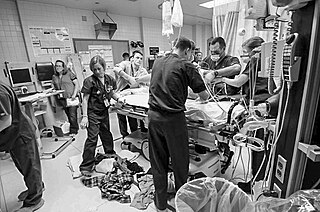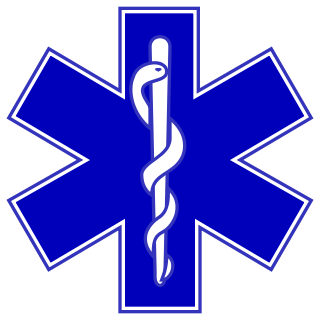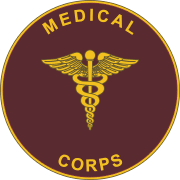The College of Physicians and Surgeons of Manitoba is a regulatory college which acts as a medical oversight body in Manitoba, Canada. Its stated purpose is to "protect the public as consumers of medical care and promote the safe and ethical delivery of quality medical care by physicians in Manitoba". [1]

A physician, medical practitioner, medical doctor, or simply doctor, is a health professional who practices medicine, which is concerned with promoting, maintaining or restoring health through the study, diagnosis, prognosis and treatment of disease, injury, and other physical and mental impairments. Physicians may focus their practice on certain disease categories, types of patients, and methods of treatment—known as specialities—or they may assume responsibility for the provision of continuing and comprehensive medical care to individuals, families, and communities—known as general practice. Medical practice properly requires both a detailed knowledge of the academic disciplines, such as anatomy and physiology, underlying diseases and their treatment—the science of medicine—and also a decent competence in its applied practice—the art or craft of medicine.

Emergency medicine is the medical speciality concerned with the care of illnesses or injuries requiring immediate medical attention. Emergency physicians specialize in providing care for unscheduled and undifferentiated patients of all ages. As first-line providers, in coordination with emergency medical services, they are primarily responsible for initiating resuscitation and stabilization and performing the initial investigations and interventions necessary to diagnose and treat illnesses or injuries in the acute phase. Emergency medical physicians generally practice in hospital emergency departments, pre-hospital settings via emergency medical services, and intensive care units. Still, they may also work in primary care settings such as urgent care clinics.
Internal medicine, also known as general internal medicine in Commonwealth nations, is a medical specialty for medical doctors focused on the prevention, diagnosis, and treatment of internal diseases. Medical practitioners of internal medicine are referred to as internists, or physicians in Commonwealth nations. Internists possess specialized skills in managing patients with undifferentiated or multi-system disease processes. They provide care to both hospitalized (inpatient) and ambulatory (outpatient) patients and often contribute significantly to teaching and research. Internists are qualified physicians who have undergone postgraduate training in internal medicine, and should not be confused with "interns”, a term commonly used for a medical doctor who has obtained a medical degree but does not yet have a license to practice medicine unsupervised.
A Physician Assistant or Physician Associate (PA) is a type of healthcare professional. While these job titles are used internationally, there is significant variation in training and scope of practice from country to country, and sometimes between smaller jurisdictions such as states or provinces. Depending on location, PAs practice semi-autonomously under the supervision of a physician, or autonomously performing a subset of medical services classically provided by physicians.

The Royal College of Physicians and Surgeons of Canada is a regulatory college which acts as a national, nonprofit organization established in 1929 by a special Act of Parliament to oversee the medical education of specialists in Canada.

A medic is a medical practitioner or student such as a medical doctor or an emergency medical responder such as a paramedic.

The barber surgeon, one of the most common European medical practitioners of the Middle Ages, was generally charged with caring for soldiers during and after battle. In this era, surgery was seldom conducted by physicians, but instead by barbers, who, possessing razors and coordination indispensable to their trade, were called upon for numerous tasks ranging from cutting hair to amputating limbs.

David Satcher, is an American physician, and public health administrator. He was a four-star admiral in the United States Public Health Service Commissioned Corps and served as the 10th Assistant Secretary for Health, and the 16th Surgeon General of the United States.

The Columbia University Roy and Diana Vagelos College of Physicians and Surgeons (VP&S) is the medical school of Columbia University, located at the Columbia University Irving Medical Center in the Washington Heights neighborhood of Manhattan.

Robert Earl Beamish, was a Canadian physician and cardiologist.

The Medical Corps (MC) of the U.S. Army is a staff corps of the U.S. Army Medical Department (AMEDD) consisting of commissioned medical officers – physicians with either an M.D. or a D.O. degree, at least one year of post-graduate clinical training, and a state medical license.
A medical specialty is a branch of medical practice that is focused on a defined group of patients, diseases, skills, or philosophy. Examples include those branches of medicine that deal exclusively with children (paediatrics), cancer (oncology), laboratory medicine (pathology), or primary care. After completing medical school or other basic training, physicians or surgeons and other clinicians usually further their medical education in a specific specialty of medicine by completing a multiple-year residency to become a specialist.
The Saskatchewan doctors' strike was a 23-day labour action exercised by medical doctors in 1962 in the Canadian province of Saskatchewan in an attempt to force the Co-operative Commonwealth Federation government of Saskatchewan to drop its program of universal medical insurance. The strike was from July 1, the day the Saskatchewan Medical Care Insurance Act took force, to July 23.

The Academy of Medical Royal Colleges (AoMRC) is the coordinating body for the United Kingdom and Ireland's 24 Medical Royal Colleges and Faculties. It ensures that patients are safely and properly cared for by setting standards for the way doctors are educated, trained and monitored throughout their careers. The Academy Council meet regularly to agree direction. The Council comprises the Presidents of the member Colleges and Faculties and four coopted council members.

Josef F. Schmid is a German-American physician, NASA flight surgeon and a major general in the United States Air Force Reserves. He served as an aquanaut on the joint NASA-NOAA NEEMO 12 underwater exploration mission in May 2007. On 8 October 2021 he became one of the first humans to be Holoported off the planet and into space, visiting the International Space Station by telepresence.
Dr. Charlotte Whitehead (Ross) was a physician important to Canadian history and Manitoban history for her role as a pioneer for women in medicine, particularly in Manitoba. Despite never being licensed by either the College of Physicians and Surgeons of Quebec or Manitoba, she was nonetheless able to practice medicine in Montreal and Whitemouth for several decades, and served the community in and around Whitemouth to a great degree during the early years of its development.
Dwight Gregory Powell is an emergency medicine physician specialist in Foothills, Alberta and a professor of family medicine and emergency medicine at the Faculty of Medicine of the University of Calgary. He is also the founder and CEO of the nonprofit Shock Trauma Air Rescue Society (STARS), a helicopter-based emergency transport service in Alberta and British Columbia.
Frances Estelle Reed Simons is a Canadian physician and researcher. She was named to the Canadian Medical Hall of Fame in 2017.

Flordeliz "Gigi" Osler is a Canadian Senator, physician, and assistant professor at the University of Manitoba. She was the 2018–2019 President of the Canadian Medical Association.

Physicians and surgeons play an important role in the provision of health care in Canada. They are responsible for the promotion, maintenance, and restoration of health through the study, diagnosis, prognosis, and treatment of disease, injury, and other physical and mental impairments. As Canadian medical schools solely offer the Doctor of Medicine (M.D.) or Doctor of Medicine and Master of Surgery degrees, these represent the degrees held by the vast majority of physicians and surgeons in Canada, though some have a Doctor of Osteopathic Medicine (D.O.) from the United States or Bachelor of Medicine, Bachelor of Surgery from Europe.